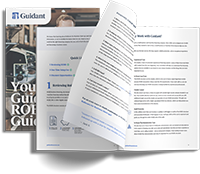For many, having a home with a lawn is part of the American dream. Yet with that comes the need for lawn care, a task more and more homeowners are outsourcing to professionals. If you enjoy being outdoors, working with people and have an inkling to be your own boss, starting a lawn care business could be the perfect fit. Here’s where you can learn how to start a lawn care business.
According to IBIS World, the landscaping services industry brought in $93 billion in revenue last year, a 5.9 percent increase over the last five years. Thanks to strong housing and property markets and increasing discretionary income, that number is expected to grow even more over the next five years, making it a very viable industry for aspiring business owners.
But starting a lawn care company takes more than just owning a lawn mower and a rake. You must have in-depth knowledge and experience in landscaping, and be able to set yourself apart from the competition.
What does it take to start a lawn care business?
Lawn care and landscaping services can encompass everything from cutting grass and watering the lawn to trimming trees, pruning bushes, and fertilizing. It’s up to the you as the business owner to decide what services to offer based on your experience and local opportunities. However, all lawn care or landscaping jobs require workers to have some degree of physical strength and stamina, as well as the equipment and training to do the job.
Top 8 Pieces of Equipment You’ll Need to Start a Lawn Care Business
Vehicle ($27,000 – $36,000)
You’ll need a reliable vehicle to transport your equipment from job to job. Experts recommend a flatbed truck with a locking toolbox and a dumping mechanism that will allow you to unload topsoil without shovels.
Utility Trailer ($800 – $5,000)
A trailer can be helpful when hauling heavy equipment that you don’t want to hoist into a flatbed. A steel-mesh trailer can cost up to $1,200, but you can get by with a simple, single-axle trailer for about $800.
Storage Space ($50 – $200/month)
You’ll need space to store your equipment when you’re not using it, which you can rent for a monthly cost. Alternatively, to save on the monthly cost if you have the room, you can use your own garage or even build your own shed.
Commercial Lawn Mower ($1,000 – $2,600)
There are several types of mowers available from ride-on mowers to walk-behinds or a combination of both. You can even invest in a robotic lawn mower if you want to go high-tech! You’ll likely want to start with at least one versatile mower and invest in more as you grow to handle a wider variety of lawns simultaneously.
Trimmers, Edgers, Blowers ($200 – $500 each)
These tools allow you to not only trim hard-to-reach places, but they can also help you clean up your work to ensure a neat and tidy appearance for homeowners.
Spreaders and Sprayers ($35 – $70)
Many clients will ask for fertilization or pesticide spraying to keep their lawn looking healthy, so it’s a good idea to have these tools on hand to handle these jobs.
Landscaping Tools ($5,000 – $6,000)
These include digging tools, cutting tools, grading tools, measuring tools, and marking tools. If you plan to operate only a lawn care service business, you may not need these tools. A full-service landscaping company will likely require at least one set of them.
Safety Equipment (cost varies)
Keeping your workers safe (yourself included) is very important. Some types of safety equipment to provide include eye goggles/face masks, earmuff-style hearing protectors, and gloves to protect you and your employees from flying debris and loud noises.
Training Needed to Start a Lawn Care Business
Once you know the equipment needed to perform lawn care and landscaping jobs, you’ll need to know how to use them properly. Even if you have hands-on experience in lawn care, you may find clients are more willing to hire you if you have official training under your belt, whether from a continuing education school or a local lawn and garden association.
While starting a lawn care company generally doesn’t require any industry-specific business licenses, there are several certifications that can also help set you apart from your competition. These certifications aren’t usually necessary, but they can reassure potential clients of your knowledge in lawn care best practices and give you leverage against your competitors. The National Association of Landscape Professionals offers a list of available landscaping certifications that are available.
Another way to gain valuable knowledge is to be an apprentice at an existing lawn care company. You’ll learn not only get hands-on experience in using the tools, but you’ll gain knowledge about the best way to run your business, manage employees and deal with customers.
8 Steps to Starting a Lawn Care Business
Once you understand the necessary tools and training needed to start your own lawn care venture, there are a few basic steps you’ll need to get your business up and running.
Research and apply for financing.
Starting a lawn care business can get expensive, especially if you have to start from scratch when buying equipment. Several financing options exist, from business lines of credit to using your retirement funds as capital without tax penalties (see more on these financing methods below). Evaluate your available options and choose the one(s) that make the most sense for you.
Determine your business structure.
You’ll need to determine what type of business structure you’ll use, whether a sole proprietorship, a partnership, or a larger LLC or corporation. This will impact what paperwork you’ll have to file and how you’ll pay taxes.
Register your business name.
Once you select a unique business name, you’ll need to register it with your Secretary of State to be sure it’s not already in use.
File the necessary paperwork.
Even if you don’t need a business license to start a lawn care business legally, your state may require you to file for a business permit. Learn about state-specific requirements here.
Set up your office.
There’s more to running a lawn care business than being outdoors all the time. You’ll need an office space to schedule jobs, speak with customers, and manage records. Whether you choose to do this from your home or rent a space, get your office organized now so you’ll be ready to roll once you open your doors.
Hire employees.
You’ll probably want to hire a team of workers who can help you complete lawn care jobs. If you get this done before you open, you’ll be ready to handle multiple jobs right away.
Get insurance coverage.
No matter how careful you and your employees are, accidents can happen, so it’s important for lawn care business owners to carry insurance to protect them against property damage or on-the-job injuries.
Announce and promote your grand opening.
Once you’ve completed the above steps, you’ll be ready to announce your grand opening and start taking on clients. Spread the word however you can, from word-of-mouth to emails to social media posts. You may even consider offering a special promotion to lure new clients in.
Financing a Lawn Care Business
Getting the necessary tools and training to start a lawn care business can be an investment. Since the majority of individuals don’t have such large sums of money readily available, many choose to apply for small business financing. Good funding options for lawn care or landscaping companies include:
- Equipment leasing. With so much high-value equipment needed to start a lawn care business, equipment leasing can be a great solution. Rather than buying equipment outright and paying a large sum upfront, this option gives you access to the equipment you need by paying a monthly fee that’s a fraction of the cost.
- Small business loans. The most common type of business loans is offered by the Small Business Administration. These loans boast low interest rates and long repayment terms, making them ideal for business owners, and they’re also guaranteed by the federal government, meaning banks will be repaid up to 85 percent of the loan even if it defaults.
- 401(k) business financing. Once a little-known method of business financing, this method is becoming more popular. It allows business owners to use funds from their 401(k), IRA, or other pre-tax retirement plan to start or buy a business without incurring tax penalties.
- Unsecured loans. Similar to a credit card, this option allows business owners to borrow money and repay at will, without needing to put up any personal property as collateral.
Getting the money, equipment and training to start a lawn care business may not happen overnight, but it can be a profitable venture for those who know what to expect going in and follow the steps to open their business legally.
To learn more about the steps to opening a business in our Complete Guide to Becoming a Small Business Owner.
















